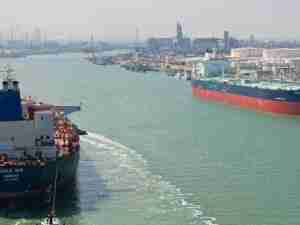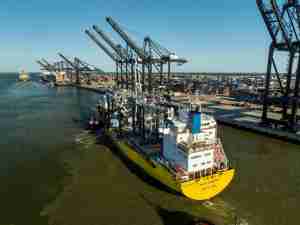The protest underscores the headwinds President Dilma Rousseff faces in her plan to dislodge infrastructure log jams that have helped keep Brazil from growing as quickly as other large emerging economies such as China, Russia and India.
"Workers occupied the Chinese ship to stop it from unloading as a start of protest against Presidential Decree 595. I will be in talks with them to resolve this," Paulo Pereira da Silva, president of the Força Sindical Labor Union, told Reuters.
The government plans to attract $27 billion in private sector investment in the next few years to modernize Brazil's underdeveloped ports and to reform the country's 20-year-old regulatory framework under rules laid out in Presidential Decree 595.
The ship, Zhen Hua 10, is carrying cranes manufactured by the Shanghai Zhenhua Heavy Industry Company. The cranes will be installed at Embraport, a private container terminal owned by local construction, chemical and infrastructure group Odebrecht, the trading company Coimex and the United Arab Emirates' DP World.
The Zhen Hua 10 is an old oil tanker manufactured in Spain in the 1980s and carries a flag of convenience from St. Vincent and the Grenadines according to MarineTraffic.com.
The cranes will be used to load and unload shipping containers at the privately run terminal, which is not yet operational. While most port infrastructure in Brazil is owned by the state, many port facilities are operated by private groups and contractors.
Government port authorities at Santos declined to comment on the ship seizure which they consider outside their domain, given that Embraport is a privately owned terminal. An Embraport spokeswoman said executives were trying to talk to protesters to negotiate an end to the occupation of the ship.
Workers' unions at the ports want to defeat the government's proposal, which they say will cut wages and legal safeguards. Under the new rules, terminal operators would be allowed to recruit their own labor, ending an obligation to source workers through a centralized agency called the OGMO that doles out available shifts to union members.
Embraport, as a purely private enterprise, will not need to go through the OGMO to fill its shifts.
The private sector port operators say the current, government-dominated system is one reason Brazil's port costs are among the world's highest.
Pereira said union workers at Santos have planned a six-hour walkout on Friday in protest of the reform measures and are planning an open-ended, general strike at all ports on March 18 if talks with the government fail to address their concerns.
The timing of these protests is particularly sensitive for global commodities markets after the droughts that sapped output from the U.S. and South American grain crops over the last year.
Brazil is entering the peak of its grains harvest from which it is expected to ship a record amount of soybeans and corn to refill the world's grain stores.
Sao Paulo state, which is home to Santos Port, is also about to begin crushing a record sugar cane crop in a few weeks, from which it is expected to ship nearly half of the world's sugar exports and large volumes of ethanol to the U.S. market.
Terminals Auction
Special Secretary of Ports Leonidas Cristino on Monday also published a list of 159 terminals that the government plans to auction to private sector investors by the end of the year.
The first auction of at least 10, 25-year concessions, which will include terminals in Santos, Brazil's biggest port by value of goods moved, and Belem at the mouth of the Amazon and Tocantins Rivers.
"The idea is to hold this auction in the first half of this year," Cristino said, adding that 42 of the terminals auctioned will be new and the rest will be for existing concessions that will expire by 2017.
The sale will










